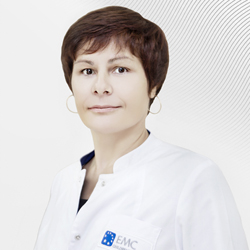
Children often complain of abdominal discomfort, heartburn, nausea, sore throat and sometimes dizziness. These symptoms can be a manifestation of a condition such as gastroesophageal reflux (when the acidic contents of the stomach flow back into the esophagus). Reflux can manifest with unusual symptoms: recurrent runny nose, hoarseness, cough, frequent sighing.
More and more children are diagnosed with malabsorption syndrome, which is a syndrome of absorption disorders of some food products in the small intestine and is accompanied by diarrhea or constipation, discomfort, bloating, and sometimes skin rashes, impaired growth and weight gain.
Often changes in the structure and size of the pancreas and the neck of the gall bladder are revealed. On their own, these changes are not cause for worry, but in combination with complaints of stomach pain, changes in appetite, stool, and the child's physical growth measurements, additional investigation is warranted to determine the cause of the digestive complaints.
IMPORTANT! Acute and sudden abdominal pain, vomiting, diarrhea, and bloody stools require urgent care by a pediatrician.
Where as in contrast periodic abdominal pain related or not related to eating, the onset of pain at night, the sensation of nausea, and reduced activity of the child most often require planned additional investigation.
The Children's Clinic uses a wide range of instrumental and laboratory studies as well as genetic tests:
- Ultrasound to conduct diagnostic tests;
- X-ray studies;
- Gastroscopy (endoscopic study of the esophagus, stomach, duodenum and small intestine) in children, and if appropriate with simultaneous biopsy of the mucosa and foreign body removal;
- Testing for the presence of Helicobacter Pylori, including HELIC SCAN breath test;
- Colonoscopy with biopsy of the intestinal mucosa.
A child can undergo a concurrent gastroscopy and colonoscopy at the Children's Clinic at EMC in Moscow with sedation under the care of experienced anesthetists.
A pediatric gastroenterologist performs diagnostic testing and prescribes treatment in accordance with the generally accepted international standards of leading Western European and US clinics. Parents receive detailed information about their child's condition and its causes. A pediatrician will first see a child suspected to have a gastroenterological condition to give a preliminary diagnosis. Once the condition is confirmed, the patient is sent to for a consultation with a pediatric gastroenterologist.
Treatment of gastroenterological conditions requires more than simply taking medication. Following a daily schedule, balanced and healthy nutrition, and physical activity are all necessary but also must be individualized for each child. Restoring digestive function is a long process. Parents often have questions and difficulties, therefore our doctors are always open to dialogue and in contact with parents about any question, 24 hours a day, 365 days a year, without weekends or holidays.
Pediatric gastroenterologists consult with patients at EMC's Children's Clinic at: 26 Trifonovskaya Street, Moscow.
Prices
| Name | Price, € | Price, ₽ | Code |
OUTPATIENT SERVICES > CONSULTATIONS > Specialist's consultation
| Gastroenterologist consultation for children up to 18 years old | 220 € | 21 768 ₽ | CS61 |
| Pediatric gastroenterologist remote consultation | 220 € | 21 768 ₽ | RCS61 |
Laboratory services
| Gastro panel (pepsinogen I, pepsines Helicobacter pyloriogen II, gastrin 17 (basal), IgG antibodi) | 100 € | 9 895 ₽ | C146 |
| Determination of urease activity Helicobacter pylori, 13C (urease respiratory test) | 51 € | 5 046 ₽ | C177 |
| Determination of the allergenic complex Allergochip ALEX2 (Allergy Explorer), 300 allergocomponents and total IgE | 741 € | 73 319 ₽ | C401 |
| Gastroscopy under intravenous sedation without biopsy | 618 € | 61 149 ₽ | ENDO9 |
| Colonoscopy without biopsy (under intravenous sedation) | 773 € | 76 485 ₽ | ENDO11 |
| Simple biopsy (up to 4 samples) | 77 € | 7 619 ₽ | ENDO1 |
| Multiple biopsy (more than 4 samples) | 231 € | 22 857 ₽ | ENDO2 |
| MRI of abdominal / retroperitoneal organs | 399 € | 39 479 ₽ | MRI7 |
| Determination of lactase deficiency on biopsy specimens of the duodenal mucosa | 89 € | 8 806 ₽ | ENDO53 |
| Abdomen ultrasound | 276 € | 27 309 ₽ | USE7 |
News and publications
